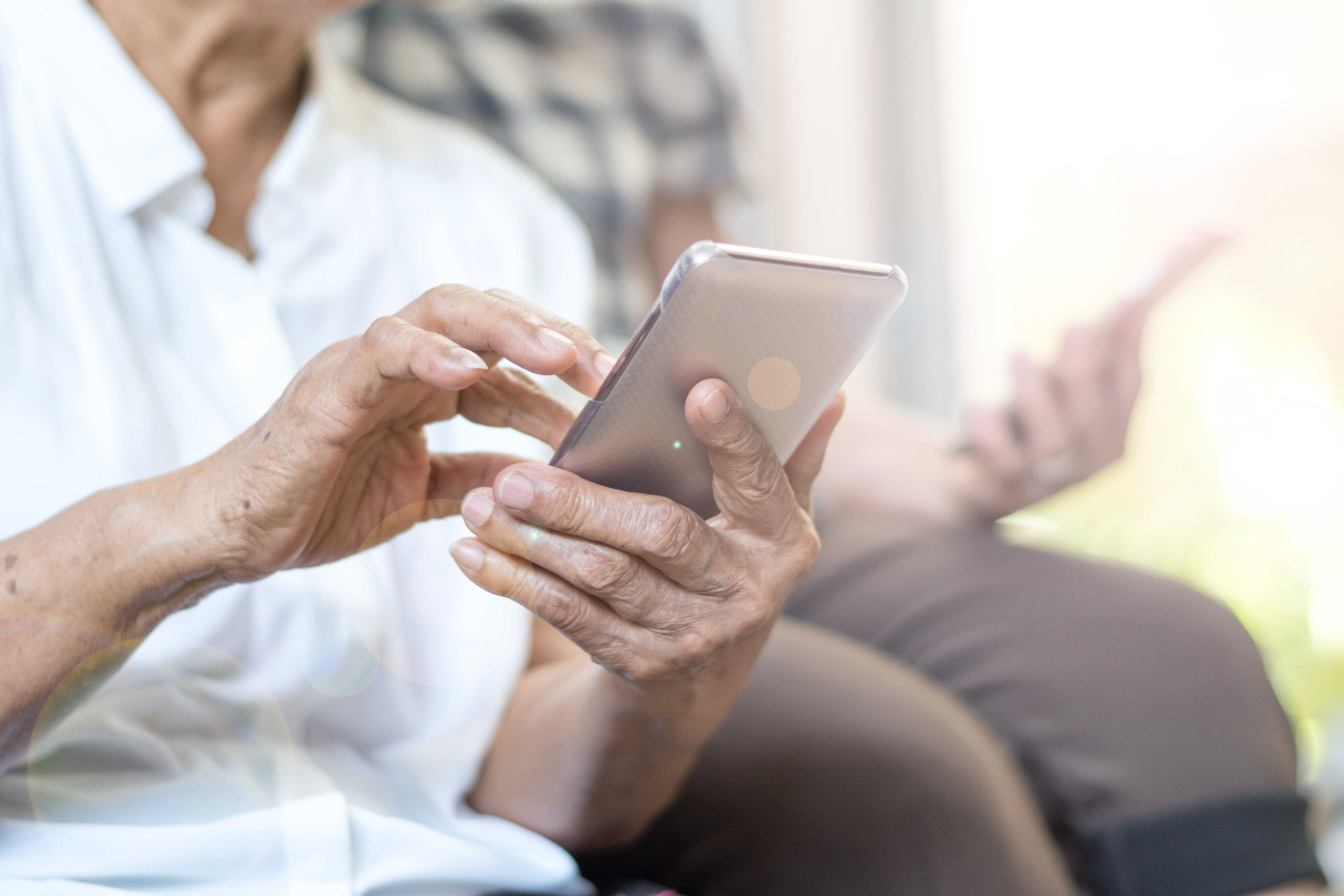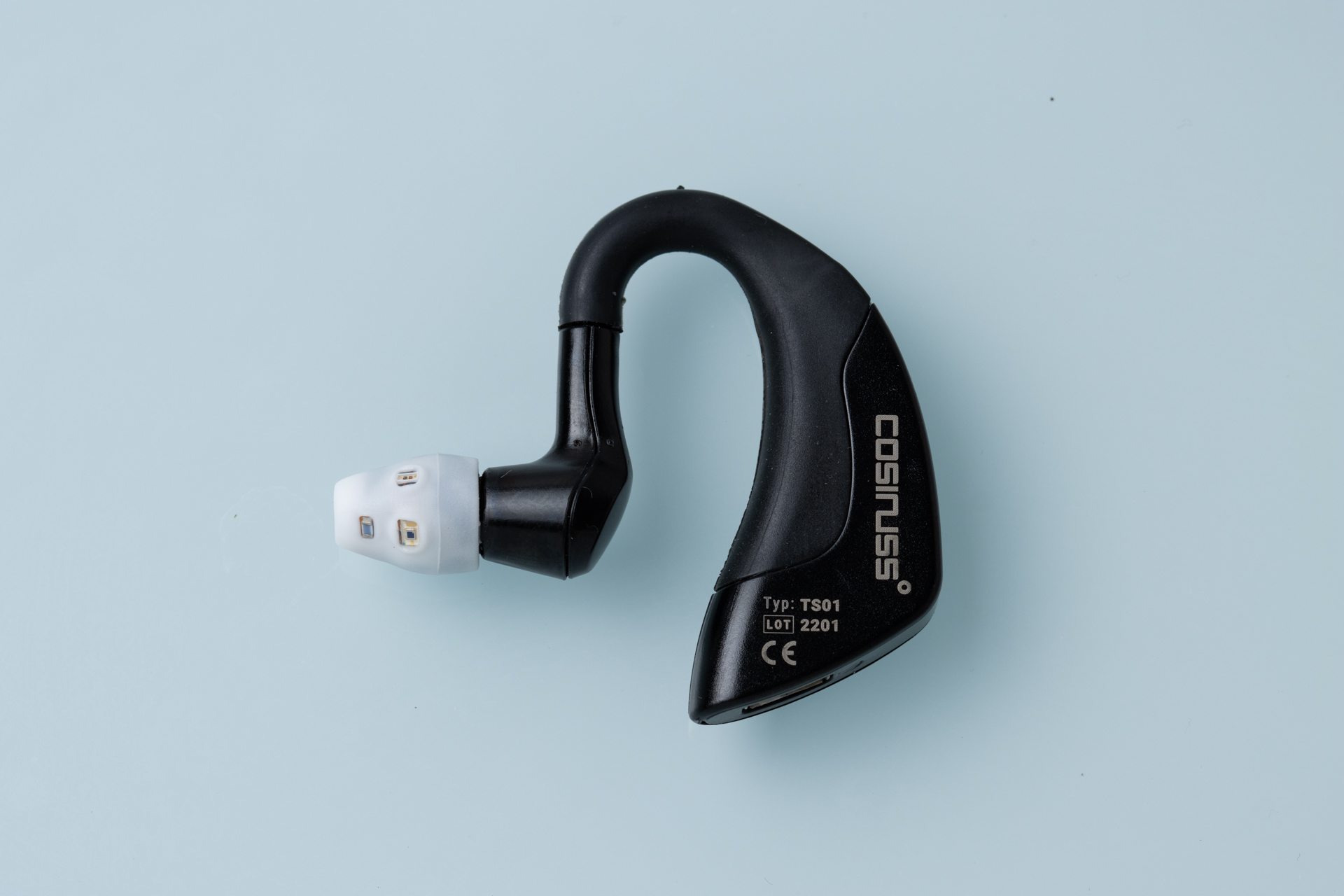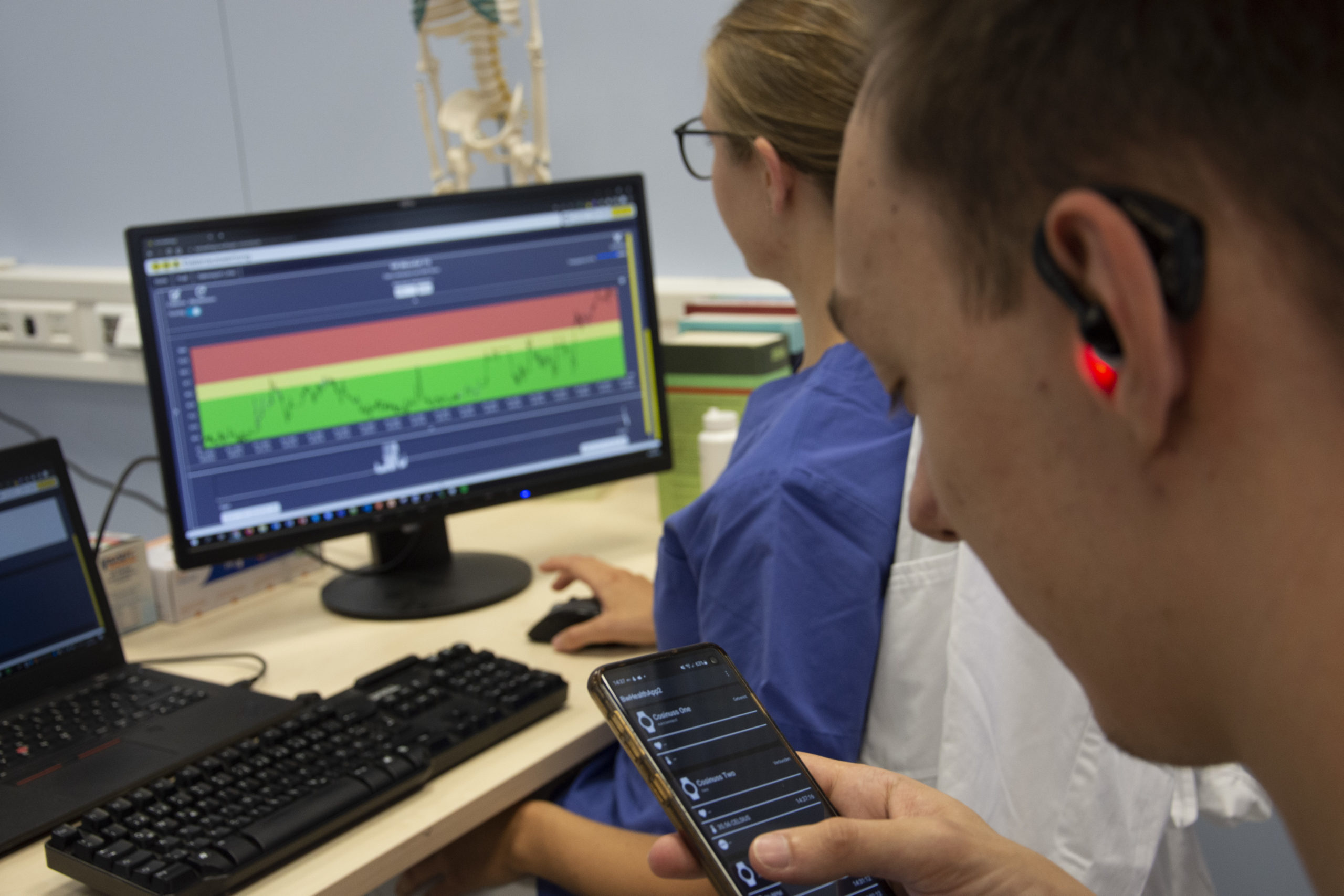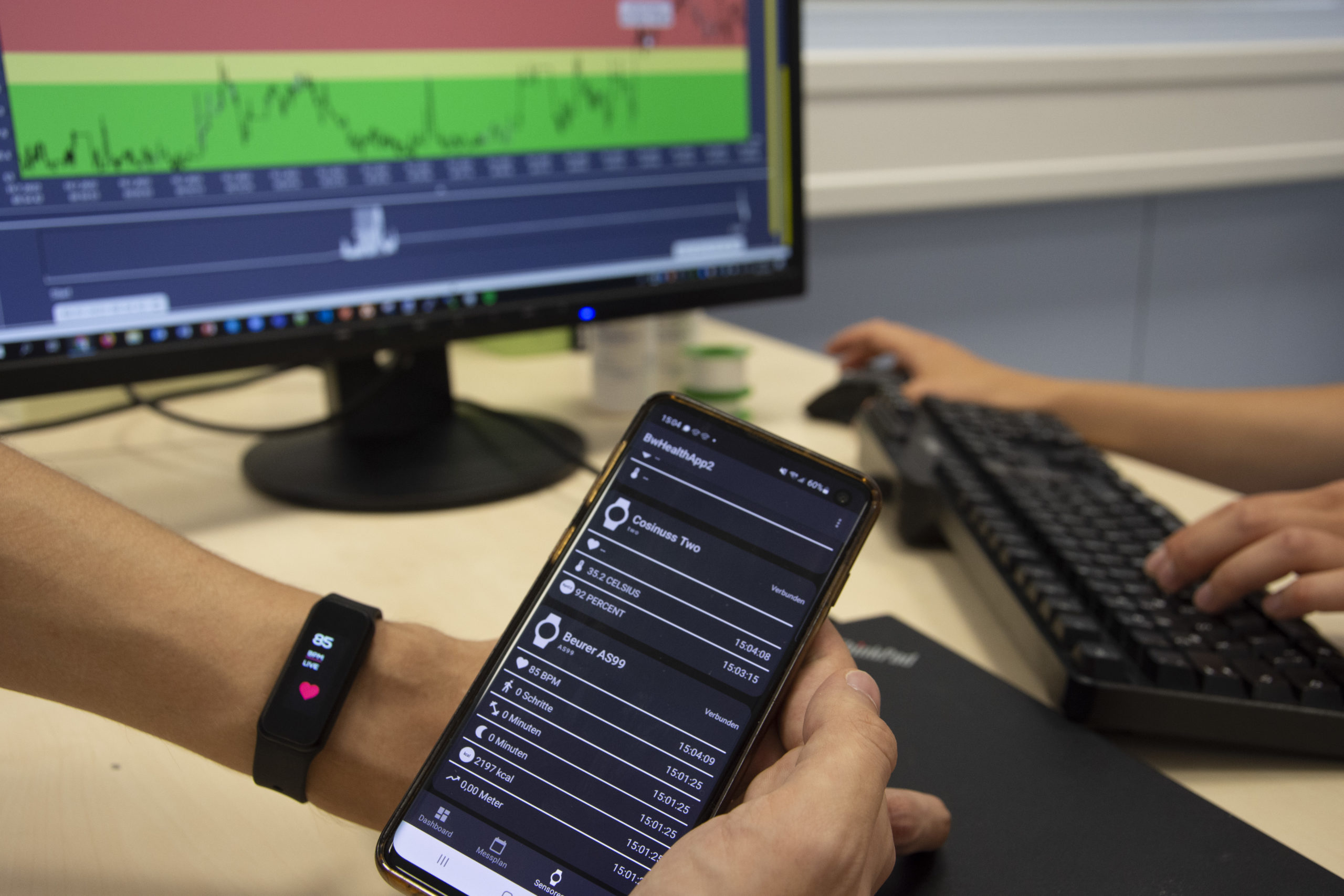Remote monitoring of vital signs in cancer patients
Monitoring cancer therapy in everyday life? – An interdisciplinary project on sensor technology and app-based questioning: Detecting Therapy Effectiveness Early and Enhancing Quality of Life. A cooperation between the AG Medizininformatik at Reutlingen University and the Center for Personalized Medicine Tübingen.

Shutterstock: 1425303080
Modern cancer therapies can often be integrated into everyday life. Cancer patients come to the oncology day clinic of the University Hospital Tübingen for their outpatient therapy in a fixed weekly rhythm. In the time between therapy sessions, they can live their daily lives at home as usual. A major disadvantage: During this period, the course of therapy and the patient’s condition cannot be monitored by clinic staff.
For this reason, the Center for Personalized Medicine at the University Hospital Tübingen has set itself the goal of testing in a pilot study whether wearables, such as the cosinuss° in-ear sensors, are suitable for monitoring patients’ vital parameters in everyday life. On the basis of the recorded data, it may be possible to detect side effects at an early stage and to follow the course of therapy. The study is being conducted in cooperation with the AG Medizininformatik at Reutlingen University.
Effects on the quality of life
Many cancers and suitable therapies are associated with a reduced quality of life for those affected.1 Measuring quality of life therefore plays an important role in cancer research. Patients are asked how they feel in general and to what extent the therapy affects their quality of life. This allows physicians and researchers to better assess the effects of new treatment methods, among other things.2
Study: overview and objective
The pilot study will examine how well the smartphone application bwHealthApp and the sensors used can be integrated into patients’ everyday lives, how reliable the data are, and whether this technology can be used to make cancer therapy in the day clinic at Tübingen University Hospital better, more individualized, and more effective in the future.
“In the future, we want to enable personalized cancer therapy that can be integrated into patients’ everyday lives with the help of modern wearables.”
In the long term, the app used is intended to be an important component of personalized medicine by linking various sensors, wearables and medical devices with each other and recording and analyzing their data. In addition to the cosinuss° in-ear sensors and fitness wristbands, this also includes implantable devices.
Study design
The study started at the end of July 2022 and will run for a total of about four months.
The study participants will come to the oncology day clinic of the University Hospital Tübingen every few weeks for systemic cancer therapy. This is where the initial setup and instruction of the app and wearables takes place. The participants are not given any instructions on how often and during which activities they have to wear the sensor. The manual entries in the app are also based on a voluntary basis.
Over a period of about one month, the participants use the in-ear sensor or the wristband in their daily lives. Among other things, heart rate, body temperature and oxygen saturation (SpO2) are measured and recorded.
In addition, the participants enter information into the bwHealthApp. Besides the current quality of life, certain events can also be entered here, such as sporting activity or side effects of the therapy.
At the end of the four-week period, participants complete a feedback questionnaire on the study, the app and the device used.
Pictures: Alfred Siewe-Reinke, Hochschule Reutlingen, 2022
Sample
Approximately 30 cancer patients (m/f/d) undergoing systemic therapy (chemotherapy, immunotherapy) are participating in the study.
By lottery, one part of the group will receive a fitness tracker wristband and another part will receive the cosinuss° in-ear sensor °Two for automated recording of vital parameters.
Method
On the one hand, data is automatically recorded by means of the sensors. This includes, depending on the device used, the following:
- Heart rate
- Body temperature
- Oxygen saturation
- Calories burned
- Number of steps
- Distance
- Activity duration
- Sleep duration
On the other hand, participants make manual entries in the app. These include activities and events as well as answers to questionnaires, such as the EORTC QLQ-C30 questionnaire. This questionnaire, which is integrated into the app, is based on the “EORTC Quality of Life”. It has been translated and validated in over 100 languages and is used in more than 5,000 studies worldwide every year (https://qol.eortc.org/).
Technical setup
The sensor’s measurement data is sent to the smartphone app via Bluetooth Low Energy (BLE). From there, the data is sent via a secure Internet connection (TLS encryption via WLAN) to the server of the computer center at Reutlingen University. If there is no Internet connection, the data is temporarily stored on the smartphone. A specially developed web platform visualizes the collected data so that it can be monitored and analyzed by medical staff.
“Among other things, the cosinuss° sensors convinced us as a convenient alternative to fitness wristbands due to the measurement in the ear.”
The cosinuss° sensors were chosen, among other things, because of the possibility of measuring vital parameters in the ear, which represents a comfortable alternative to a wristband for many study participants. Furthermore, in addition to pulse rate, the cosinuss° Two offers two additional relevant vital signs: Oxygen saturation (SpO2) and body temperature. Another decision criterion was the possibility of energy-saving data transmission between sensor and smartphone via Bluetooth Low Energy.

cosinuss° in-ear sensor °Two
For more information on the data security of the technical setup, click here: https://bwhealthapp.reutlingen-university.de/page/home/#dataEncryption
Results and outlook
The study started at the end of July 2022. Initial results are therefore not yet available3. These will be published here as soon as the data have been collected and analyzed.
Update 2025:
As part of the study, the following publications have appeared to date, which deal with the user-friendliness, feasibility and design of the developed app:
Junger, Denise; Martínez Madrid, Natividad; Thies, Christian (2019): Open wearables mobile platform to support personalized medicine, Hochschule Reutlingen, https://doi.org/10.34645/opus-2456
Junger, D., Möller, Y., Malek, N.P., Thies, C. (2020). Die bwHealthApp: Eine Plattform und Infrastruktur zum dauerhaften dezentralen individuellen Patientenmonitoring für die personalisierte Medizin. In: Pfannstiel, M.A., Holl, F., Swoboda, W.J. (eds) mHealth-Anwendungen für chronisch Kranke. Springer Gabler, Wiesbaden. https://doi.org/10.1007/978-3-658-29133-4_7
Storz, Philip; Wickner, Sandra; Batt, Benjamin; Schuh, Johannes; Junger, Denise; Thies, Christian (2021): bwHealthApp : a software system to support personalized medicine by individual monitoring of vital parameters of outpatients. In: Proceedings of the 14th International Joint Conference on Biomedical Engineering Systems and Technologies (BIOSTEC 2021) – Volume 5: HEALTHINF, https://doi.org/10.5220/0010324106130620
Promotion and funding
The study is supported by the Ministry of Social Affairs and Integration with funds from the state of Baden-Württemberg.
Quellen / References
- Schlander, Michael: PRO („patient-reported outcomes“) und Lebensqualität in der Onkologie. In: Forum 2020 · 35:382–390 https://doi.org/10.1007/s12312-020-00841-9 Online publiziert: 11. September 2020
- Krebsinformationsdienst: Lebensqualität und Krebs: Verfassung, Befinden, Beziehung. https://www.krebsinformationsdienst.de/leben/krankheitsverarbeitung/lebensqualitaet.php (letzter Abruf: 12.7.2022)
- Status: August 2022

